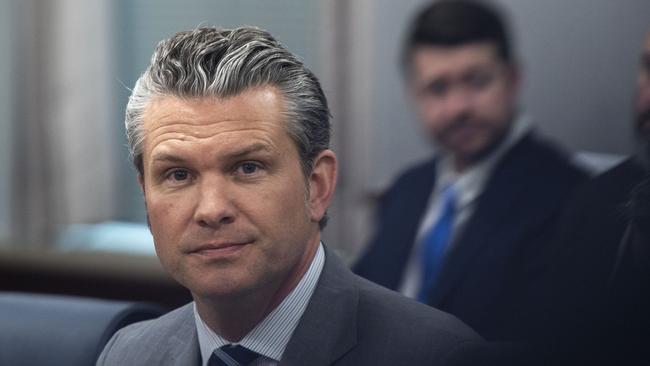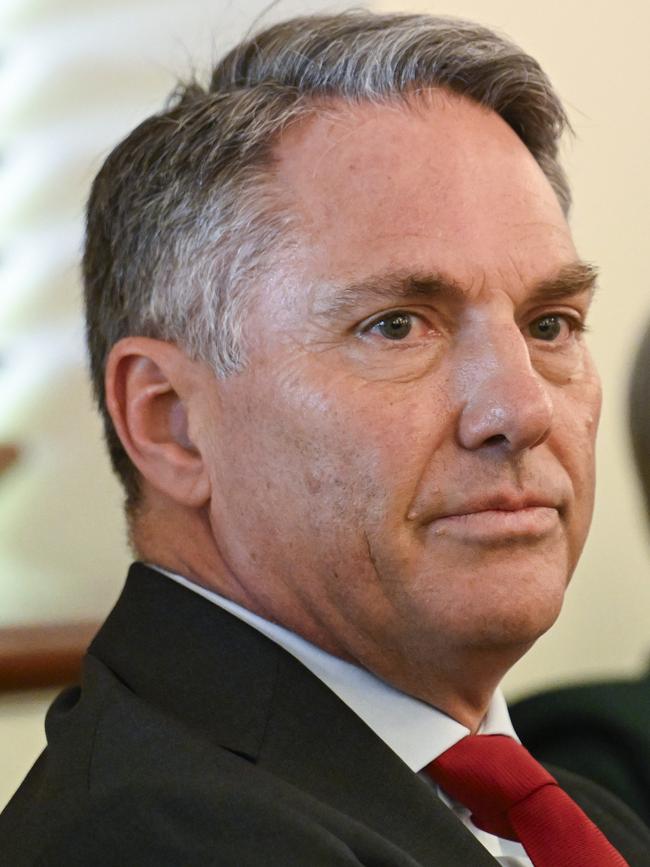Call to arm: US in direct defence spending plea to Richard Marles
US Pentagon chief Pete Hegseth has issued a direct call for Australia to lift defence spending in face-to-face talks with Richard Marles.

Donald Trump’s Pentagon chief Pete Hegseth has issued a direct call for Australia to lift defence spending in face-to-face talks with Richard Marles, amid a US push for its global allies to stop free-riding off American military power.
The Defence Minister assured his US counterpart that Australia was “very much up for that conversation”, just a day after Anthony Albanese ridiculed the nation’s top strategic think tank over its criticism of Australia’s “business as usual” defence budget.
The US Defence Secretary’s call comes ahead of the Prime Minister’s first meeting with the US President in a fortnight at the G7 summit in Canada, where Mr Albanese will be looking for tariff relief and a firm commitment from Mr Trump to the AUKUS nuclear submarine partnership.
The government left the defence budget languishing at about 2 per cent of GDP in the March budget, rising to a forecast 2.33 per cent in eight years, despite its own warnings of unprecedented strategic circumstances and US calls for allies to lift military spending to at least 3 per cent of national output.
Mr Marles revealed Mr Hegseth urged him to boost the defence budget when they met on the sidelines of the Shangri-La Dialogue in Singapore on Friday.
“The need to increase defence spending is something that he definitely raised,” Mr Marles told the ABC.
“You’ve seen the Americans in the way in which they’ve engaged with all of their friends and allies, asking them to do more. And we can completely understand why America would do that. And I would say this was done in a very respectful and dignified way, and we understand it and we’re very much up for that conversation.”
Mr Marles declined to reveal how much more Mr Hegseth wanted Australia to spend on defence. But the now-head of policy at the Pentagon, Elbridge Colby, made clear ahead of his April appointment that Australia needed to lift the defence budget to at least 3 per cent of GDP – a benchmark that would require an extra $28bn a year to be pumped into the military.
Mr Trump has called on European nations to spend even more, demanding 5 per cent of GDP from NATO members.

The Australian Strategic Policy Institute warned in its Cost of Defence report this week that the government’s failure to boost defence spending and its focus on future capabilities such as AUKUS had left a hollowed-out defence force that was ill-prepared for near-term conflict. “While those future capabilities are strategically important, they offer little immediate enhancement, thus creating a ‘paper ADF’ that lacks readiness for near-term conflict scenarios,” it said.
The Prime Minister responded to the report on Thursday by attacking the think tank’s credibility and independence.
“ASPI regularly produce these sort of reports … I think it’s predictable, frankly,” Mr Albanese said. “What we’re doing is getting on with the defence assets and providing the investment for those assets to be upgraded.”
ASPI executive director Justin Bassi welcomed Mr Marles’ comments on Friday. “The Defence Minister is absolutely right that we should be up for a conversation on increasing defence spending to meet the rising strategic threats we face,” Mr Bassi said. “Our report this week reached the same conclusion. We need to invest more, invest sooner and invest more smartly.
“That’s simply in Australia’s interests and that’s a widely accepted view in defence and strategic circles.”
The Prime Minister’s long-awaited meeting with Mr Trump in Alberta next month is shaping as a key moment in the bilateral relationship. Mr Albanese, who may also make a trip to Washington DC on either side of the summit, will be seeking a tariff carve-out and a firm commitment from the President to the AUKUS deal to provide three Virginia-class submarines to Australia.
British Prime Minister Keir Starmer announced before a visit to the White House in February that the UK would lift defence spending to 2.5 per cent of GDP by 2027, with a “clear ambition” to reach 3 per cent in the next term of parliament.
Mr Marles said Mr Hegseth had made clear the Trump administration’s support for AUKUS when they met in February, and the Defence Secretary reiterated that message on Friday. “I’m very much encouraged by the relationship which is growing between myself and Pete Hegseth in our respective roles,” he said. “But fundamentally we feel a sense of confidence about how we can manage AUKUS specifically.”
Opposition defence spokesman Angus Taylor said Labor had “chronically underfunded defence” despite worsening strategic threats. “We must ensure our Defence Force has the funding it needs to keep our nation safe and prepared,” he said.
“Before the election the Coalition committed to increasing defence spending to 2.5 per of GDP within five years and 3 per cent within a decade. That was a clear signal: we are serious about delivering capability at the scale the times demand.”
Mr Hegseth will deliver the keynote speech at the Shangri-La Dialogue on Saturday. The address to Southeast Asia’s premier defence conference has been hotly anticipated, amid regional concerns over the Trump administration’s trade war, foreign aid cuts and escalating tensions with China. Mr Marles will also address the dialogue, calling for fresh global rules to curb nuclear weapons proliferation.
He will argue expired Cold War arms treaties need to be replaced with new multilateral agreements. He will also single out China, arguing its “rapid nuclear modernisation and expansion … is another reason the future of strategic arms control must be revitalised”.





To join the conversation, please log in. Don't have an account? Register
Join the conversation, you are commenting as Logout